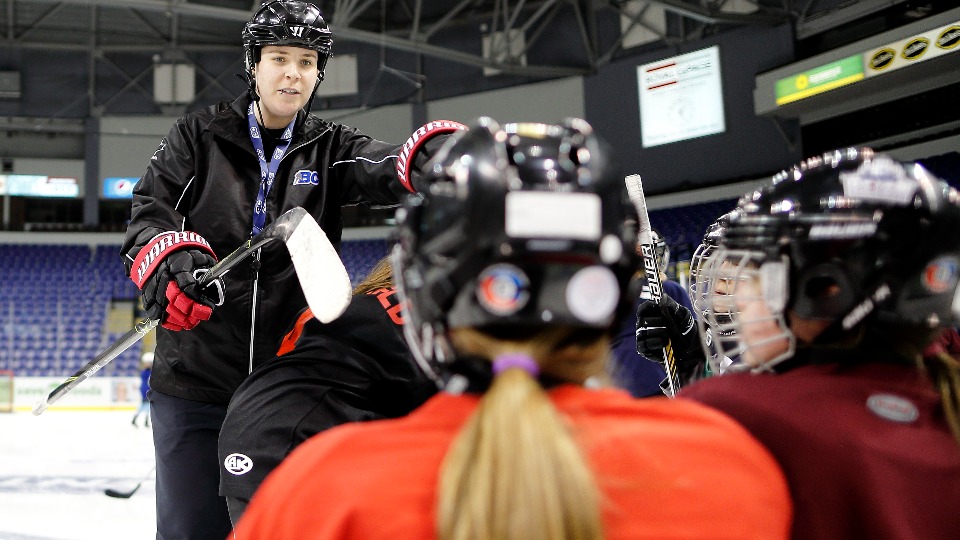Hockey Canada and its development programs are helping women earn their coaching certification and give the next generation leaders to look up to
Hockey Canada is a leader in the game, and the organization is stepping up
by providing opportunities for more women to get involved.
Through initiatives like
Pond to Podium
,
We Are Coaches
and the
Women Master Coach Developer
program, Hockey Canada is putting a focus on coach certification and
getting more women behind the bench.
“If we want the game to grow, we need women involved. If we want the game
to continue to be welcoming and have a positive environment, we need
women,†says Teal Gove, manager of hockey development with Hockey Canada.
“Having women as coaches increases the likelihood that girls will continue
to play and then also get involved in leadership positions, which just
makes the game better at all levels.â€
That’s where a program like We Are Coaches is important. It was designed to
increase the number of women coaching across the country. The clinics –
taught by women, for women – help build infrastructure to support and
sustain women’s participation in hockey by removing barriers to coaching
education.
“Sometimes it’s pretty intimidating going into a room full of male coaches
to get coaching certification, and many [women] may hesitate because of
that,†says Gina Kingsbury, director of women’s national teams. “So, we
have to make sure we break down those barriers, make it as accessible as
possible, and, not only to grow our female presence and provide growth to
ensure that we have large numbers, but also, there’s a lot of knowledge in
these female leaders.â€
The women leading the We Are Coaches clinics are products of the Women
Master Coach Developer program, which was launched in 2019. Delegates are
selected for the program, and they must complete online modules and
in-person sessions, as well as collaborate with their Member to deliver a
We Are Coaches program in their province or territory in order to receive
their certification.
“You can’t be what you can’t see. If women don’t see other women coaching,
they’re not going to coach,†says Gove. “It is important that girls have
role models that they can drive to be, and seeing women in leadership
positions is key to that.â€
Over the next year, with financial support from the Hockey Canada
Foundation, more than 40 We Are Coaches clinics will be held across Canada,
bringing hundreds of future coaches into the game.
That list includes a number of university players; every single
student-athlete competing in women’s hockey across U SPORTS was offered
NCCP Coach 1 and Coach 2 training through We Are Coaches.
“When Hockey Canada offered the opportunity, it was huge for our players,â€
says Caroline Ouellette, a four-time Olympic gold medallist and member of
the coaching staff at Concordia University, which had 18 current players
and eight alumna register. “Many saw the value of getting their coaching
certification. We know that many of them will become the coaches of
tomorrow.â€
The program isn’t just about developing the tactical skills needed to
coach. It’s far more than that. The women also learn about leadership
skills.
“Coaching is a collaboration, and you want to work closely with the players
and get involved in how they are doing and feeling,†Ouellette says. “[The
We Are Coaches participants] realize that there is so much to cover in
coaching; you never take decisions that are personal towards a player, you
do what will help the team perform the best, and I think they realize it is
harder than it looks.â€
In her role as the head of the women’s program at Hockey Canada, Kingsbury
has seen the benefits of these programs firsthand. The more women at the
highest levels that go through the training, the better the chances they
stay in the game.
“From a national team perspective, it provides a lot of opportunity for our
athletes in their transition. A lot of them are taking these courses, or
they’re taking these opportunities to enhance their second career,†she
says. “They’re already thinking ahead of when they are done playing; they
still want to be a part of this game and want to be a part of growing this
game. These programs are allowing our athletes and staff to be able to
continue to grow and think of the possibility of transitioning into the
game in a different role, which I think it’s huge.â€
Inspiring future generations comes by showing young girls that they can see
themselves in their role models, on and off the ice. As the push for a
sustainable professional league is led by some of the best women in the
game, Hockey Canada is leading the way in developing leaders behind the
bench.
“Hockey Canada is world-leading in the game of hockey and certainly
world-leading in the game of women’s hockey. Not only are we part of the
movement, but we are now leading that movement,†says Kingsbury. “I think
Hockey Canada sees that, values that and certainly demonstrates that with
our initiatives and our focus through these programs. Our overall goal is
to get women into those [leadership] roles.â€



